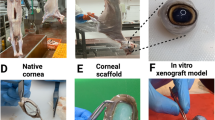Abstract
IF the term ‘keratin’ were applied only to those proteins which contain a high proportion of cystine, which give a keratin-type of X-ray diffraction photograph and which dissolve with ease only in alkaline solutions of reducing agents, then keratins, so far as is known, are confined to the epidermis and epidermal appendages of vertebrates, and are always intracellular. Other so-called keratins from vertebrate egg capsules1,2, byssus threads of Mytilus2, etc., though they contain cystine, can be dissolved by solvents other than alkaline reducing agents, do not give a keratin-type of X-ray photograph and are extracellular structures.
This is a preview of subscription content, access via your institution
Access options
Subscribe to this journal
Receive 51 print issues and online access
$199.00 per year
only $3.90 per issue
Buy this article
- Purchase on SpringerLink
- Instant access to the full article PDF.
USD 39.95
Prices may be subject to local taxes which are calculated during checkout
Similar content being viewed by others
References
Champetier and Fauré-Fremiet, C.R. Acad. Sci., Paris, 207, 1133 (1938).
Young and Inman, J. Biol. Chem., 124, 189 (1938).
Chèvremont and Frederic, Arch. Biol. Paris, 54, 589 (1943).
Smith, Phil. Trans., B, 227, 111 (1937).
Author information
Authors and Affiliations
Rights and permissions
About this article
Cite this article
BROWN, C. Keratins in Invertebrates. Nature 166, 439 (1950). https://doi.org/10.1038/166439a0
Issue date:
DOI: https://doi.org/10.1038/166439a0
This article is cited by
-
Keratin hydrolysate-modified amino resin for particle board panel product
Journal of the Indian Academy of Wood Science (2022)
-
Multifaceted role of keratins in epithelial cell differentiation and transformation
Journal of Biosciences (2019)
-
�ber die Reifung der Nesselkapseln bei Dipurena reesi Vannucci (Hydrozoa)
Zeitschrift f�r Zellforschung und Mikroskopische Anatomie (1968)
-
Untersuchungen zur Biologie, Anatomie und Histologie von Polystomum integerrimum Fr�hlich
Zeitschrift f�r Parasitenkunde (1961)
-
Cytochemical Research on Coelenterate Nematocysts
Nature (1955)



